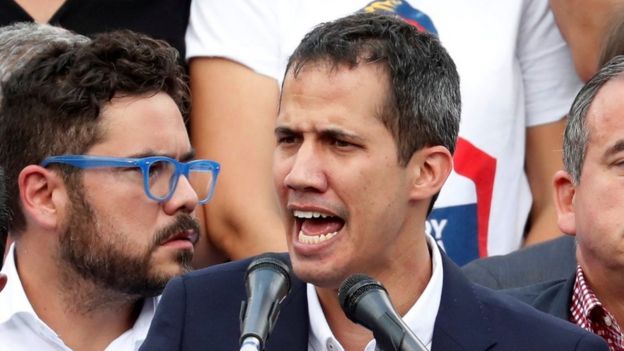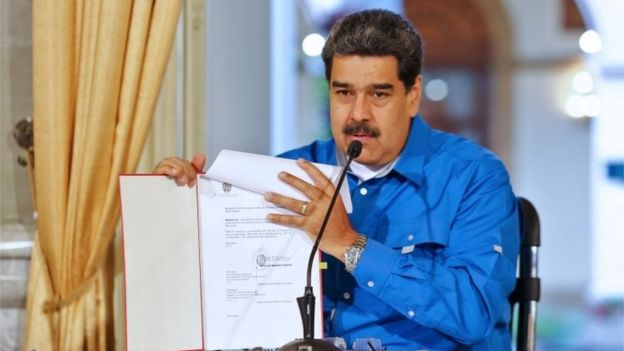 |
| Juan Guaidó told supporters that the government's "chain of command" was broken |
"They threatened us and here we are, putting forward our face for Venezuela," he told a huge rally.
Mr Guaidó has called on President Nicolás Maduro to resign.
The two men have been at loggerheads for more than a month. While Mr Guaidó has been recognised by more than 50 countries, Mr Maduro, who is backed by China, Russia and Cuba, insists he is the only legitimate president.
Venezuela's political crisis has been sparked by an economic meltdown in which hyperinflation has hit salaries and savings, leading many to flee the country.
What did Guaidó say on his return?
Mr Guaidó was received at the Simón Bolivar International airport by diplomats from the US and EU nations and a crowd of supporters who chanted "Guaidó, Guaidó" and "Yes we can".
"We know the risks we face," he told reporters on arrival. "We are strong, we carry on."
Accompanied by his wife, Mr Guaidó then travelled to an avenue in the eastern Caracas district of Las Mercedes to address an anti-government rally. While outside the country he had used social media to urge his supporters to gather.
After saying that he had been threatened with "jail, death" before his return, Mr Guaidó said he had been treated well on his arrival at the airport. He said immigration officers even greeted him at the airport with the words "welcome, president".
"It is evident that after the threats, somebody did not follow orders. Many did not follow orders. The chain of command [in the government security forces] is broken," he told the crowd.
He said he would be calling a meeting of unions representing public sector employees on Tuesday, and called for nationwide protests on Saturday.
And he paid tribute to those who lost their lives in clashes at the Brazil-Venezuela border when an attempted aid delivery was blocked from entering the country by the Venezuelan military.
Why is his return risky?
After Mr Guaidó proclaimed himself interim president on 23 January, Venezuela's Supreme Court - which is dominated by loyalists of President Maduro - placed a travel ban on the opposition leader.
Mr Guaidó defied that to attend a fundraising concert in Colombia on 22 February organised by billionaire Richard Branson.
Mr Guaidó also led efforts to try to bring humanitarian aid, mainly donated by the US, into Venezuela. The government of Mr Maduro rejected the aid, arguing it was part of a US plot to overthrow him.
The president ordered the closure of borders with Colombia and Brazil. Soldiers blocked the aid trucks, leading to the clashes that left at least five people dead.
The Maduro government alleged - without giving any evidence - that the aid was contaminated and carcinogenic.
Mr Guaidó, who heads the opposition-led National Assembly, proclaimed himself Venezuela's acting president after the legislature declared Mr Maduro's May 2018 re-election illegitimate.
He says he wants to set up a transitional government and call new elections.
How likely is his arrest?
Flouting the travel ban imposed by Venezuela's highest court is likely to get Mr Guaidó into trouble.
President Maduro told ABC last week: "He can't come and go, the justice system had banned him from leaving the country. I respect the laws."
The Venezuelan government has in the past not been shy to arrest opposition leaders. Lawmaker Juan Requesens has been in jail since August over his alleged role in a drone attack on President Maduro. Others have left the country for fear of arrest.
However, when the secret police arrested Mr Guaidó on 13 January, he was released after half an hour.
Communications Minister Jorge Rodríguez said that arrest was "irregular" and the agents involved were dismissed.
Mr Guaidó appears willing to face the risk of arrest, saying: "If the regime dares, of course, to kidnap us, it will be the last mistake they make."
What if he is arrested?
Arresting Mr Guaidó would cause a huge outcry.
Shortly before his return on Monday, US Vice President Mike Pence sent a warning to Mr Maduro, saying any threats against Mr Guaidó "will not be tolerated and will be met with swift response".
EU foreign policy chief Federica Mogherini has said that any measure that put at risk Mr Guaidó's "freedom, safety or personal integrity would represent a major escalation of tensions".
Diplomats from the Lima Group, a bloc of 14 Western countries created to tackle the Venezuelan crisis, said last week that "serious and credible threats" had been made against the life of Mr Guaidó.
It said "any violent actions against Guaidó, his wife, or family" would be met by all "legal and political mechanisms".
How secure is Maduro?
While international pressure on President Maduro has steadily increased, the Venezuelan leader has dismissed all calls for him to step down and denounced them as attempted coups d'état.
 |
| President Maduro says that he is facing "imperialist aggression" |
According to Colombian migration officials, more than 500 soldiers have deserted from the Venezuelan army over the past weeks.
While this is a sign that lower-ranking soldiers are suffering the same hardships - shortages of food and medicine - as the general population and are willing to follow the more than three million people who have left Venezuela over the past years, there is no sign yet of a general switch in loyalty.
Government loyalists also still control much of the judiciary and the National Constituent Assembly, a body Mr Maduro set up to bypass the opposition-controlled legislative.
However, there are unconfirmed reports that Diosdado Cabello, the National Constituent Assembly head, has sent his two children to Hong Kong, which the opposition thinks is a sign of growing nervousness.
The government also appears to be feeling the sanctions imposed by the US. Reuters reported last week it had taken eight tonnes of gold from the Central Bank to sell abroad to raise badly needed cash.
Source: BBCNews


No comments:
Post a Comment
Add a Comment...